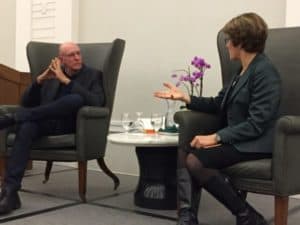As part of International Open Access Week 2016, UC Press offers the following excerpt from the Union of Concerned Scientists (UCS) and Elementa Editor-in-Chief Anne Kapuscinski. Stay tuned all week for more special content from UC Press Open Access initiatives.

In my new role of Chair of the Board of the Union of Concerned Scientists (UCS), I had the great honor of joining UCS’ delegation at the Paris COP21 climate meeting last December. A clear message from Paris was that we must rapidly transition to a net-zero and climate-resilient society. Scientists at the recent 1.5 Degrees Conference at Oxford University, co-sponsored by UCS, underscored the magnitude of the challenge. And, on Food Day, my public conversation with Michael Pollan at Dartmouth mentioned that agroecology research shows a clear opportunity to help transition our nation’s food system to sustainability, a goal of Plate of the Union.
If you’re reading this blog, you probably agree that our society needs more active engagement of scientists in solving grand sustainability challenges. And you’re aware that when scientists from different disciplines and ways of seeing the world interact, new perspectives and solutions emerge. Thankfully, the current generation of young scientists is embracing trans-disciplinary approaches to their research, with the skills to match the task. But when trying to publish their work, they face the obstacle that most academic journals are organized along traditional disciplinary silos, with editorial boards ill-equipped or unwilling to review papers reflecting this critically needed cross-fertilization. And they hunger for fully open access publishing instead of paywalls restricting access to their papers… Read more on the Union of Concerned Scientists’ blog, The Equation
About the author: Anne Kapuscinski is Editor-in-Chief of the Sustainability Transitions domain of UC Press’s trans-disciplinary, Open Access journal Elementa: Science of the Anthropocene. Her current research is on integrated food-energy systems and on algae-based feed for a sustainability transition in aquaculture—the world’s fastest growing food sector.

